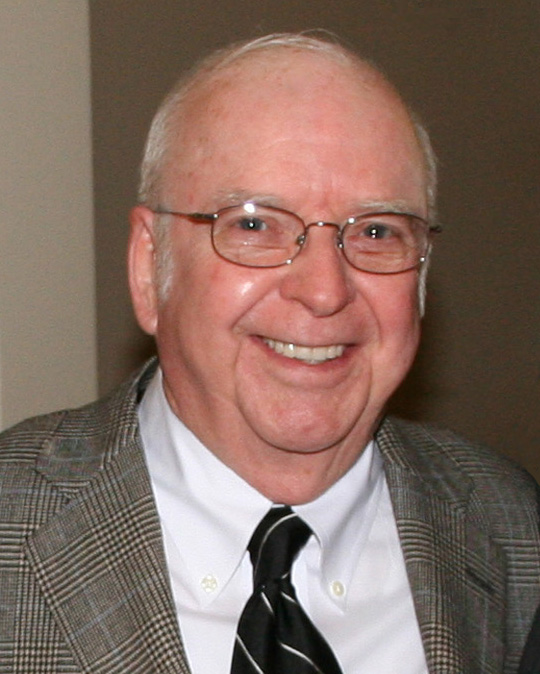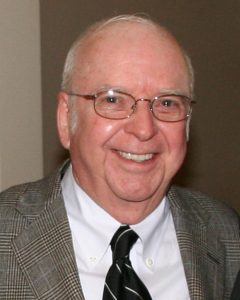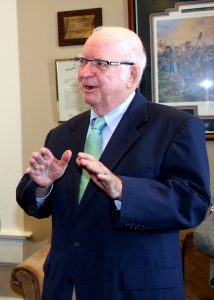Former Mississippi Supreme Court Chief Justice Edwin Lloyd Pittman died on September 25 at his home in Ridgeland. He was 89.
Memorial services will be conducted at a later date.
In his 40 years of public service, Pittman was elected to positions in all three branches of state government. He joined the Mississippi Supreme Court in January 1989. He became Chief Justice in January 2001. Chief Justice Pittman retired from the Court on March 31, 2004.
During his more than three years as head of the state court system he worked tirelessly to improve efficiency and transparency of the courts; to protect judicial independence and strengthen ethics, impartiality and fairness within the judiciary and the legal profession; and to improve access to justice for the poor.
Former Chief Justice Bill Waller, Jr., said, “Chief Pittman provided exemplary leadership to the Mississippi Judiciary as Chief Justice. His accomplishments for efficiency, transparency and access to justice had a profound effect on our legal system. He championed the establishment of aspirational time standards for the court processes, brought rule changes to allow cameras in the courtroom and improved access to justice for the poor and disadvantaged, to name a few. The court system today is better for his untiring efforts and dedication to duty.”
Judge James Graves of the Fifth U.S. Circuit Court of Appeals said, “He was a consummate politician and public servant. He’s an important figure in Mississippi’s history.” They served together on the state Supreme Court. Judge Graves’ early public service was in the Mississippi Attorney General’s Office when Pittman was Attorney General. “He hired me as a special assistant attorney general when he was AG.”
Pittman was Attorney General from 1984 to 1988. He began his public service as a state Senator from Hattiesburg, serving in the Mississippi Senate from 1964 to 1972. He served as State Treasurer from 1976 to 1980, and as Secretary of State from 1980 to 1984. He also retired from the Mississippi National Guard as Brigadier General with 30 years of service.
Gov. Haley Barbour awarded former Chief Justice Pittman the Mississippi Medal of Service. At the Sept. 28, 2011, ceremony, Pittman said, “The people of this state have honored me with a wonderful trip through life.”
Chief Justice Mike Randolph said, “Even though he served in all these important government positions, he never lost his common touch. I regret that I didn’t get to serve with him. I hope that when I’m done, that I will be as well thought of as he was. ” Gov. Barbour appointed Chief Justice Randolph to the Court when Chief Justice Pittman retired.
Attorney Danny Cupit said, “He served with distinction in all three branches of government for almost a half century. His loss is Mississippi’s loss. I was proud to have known him.” Their friendship developed around politics nearly 50 years ago. Cupit, a longtime Democratic Party activist, recalled that Pittman agreed to make speeches in support of Presidential candidate Jimmy Carter when other state elected officials were a bit shy. Pittman was candid in his views. “I admired that. He did what he thought was right,” Cupit said.
Law partner Jerry Mills said, “Judge Pittman was a lawyer of vast experience. But more importantly, he was a friend and a trusted colleague.”
Pittman joined the Ridgeland firm of Pyle, Mills, Dye & Pittman, now known as Mills, Scanlon, Dye & Pittman, shortly after he retired from the Supreme Court. Pittman was of counsel. Attorney John Scanlon said, “We were very fortunate to have the benefit of Justice Pittman’s vast experience in all three branches of government, and he always provided helpful insight when we were analyzing cases and legal issues.”
Former Mississippi Bar President Jennifer Ingram Johnson recalled the longtime friendship of her father, Hattiesburg attorney Carroll Ingram, with Chief Justice Pittman. “They were loyal, good friends, and my dad appreciated that friendship very much,” she said.
While the Supreme Court decided thousands of appeals during Pittman’s more than 15 years of judicial service, his legacy is written in the court rule changes which he oversaw as Chief Justice.
Pittman believed in government transparency and public access. Within three months after he became Chief Justice, on March 30, 2001, dockets of the Supreme Court and Mississippi Court of Appeals began being published on the web site of the Mississippi Judiciary. He led efforts to install camera systems in the appellate courtrooms. The Court’s internet broadcast of Supreme Court oral arguments began April 2, 2001, and Mississippi Court of Appeals oral arguments began being broadcast on Aug. 7, 2001. At a time when only a handful of states allowed news media cameras in courtrooms, he formed a study committee and tasked them with figuring out best practices. Broadcasts and pictures of courtroom proceedings are commonplace today, operating under camera coverage rules which went into effect July 1, 2003, under his leadership.
He sought to speed up the process by which criminal and civil matters were resolved in the courts; advisory time standards for trial courts were adopted on Nov. 20, 2001.
He spearheaded efforts to revise the Code of Judicial Conduct; revisions which went into effect April 4, 2002, represented the first major revisions to Mississippi’s judicial canons since they were adopted in 1974. Among the revisions were amendments which addressed judicial election campaign conduct. Those rule changes also included revisions regarding recusal motions in trial courts. Also adopted in April 2002 was a revision to rules for attorney discipline which prohibit readmission to the practice of law by lawyers convicted of felony crimes of deceit and certain drug crimes.
In announcing those rule changes in April 2002, Chief Justice Pittman said, “The adoption of these rule changes first gives the public some protection that Mississippi’s system of justice will remain a system of integrity and honor, and, secondly, they protect the individual judge’s environment …. We are trying to assure judges that they are free from outside influences and that they can bring their knowledge and their integrity to every case.”
He signed rule amendments that changed the practice of law in Mississippi. A set of rule amendments and commentary adopted on Feb. 20, 2004, addressed consolidation, joinder and venue in civil litigation. The rule changes came at a time when mass tort cases were being filed with hundreds of plaintiffs, including out-of-state residents, suing companies with little or no connection to specific venues.
Chief Justice Pittman was also deeply concerned about access to the courts by people who could not afford civil legal representation. He laid the groundwork for what would later become the Access to Justice Commission when he convened a meeting of lawyers, judges and other elected officials and religious leaders to discuss ways to improve the delivery of civil legal services to the poor. At that meeting on Sept. 6, 2002, Chief Justice Pittman said, “We have to recognize the fact that we in many communities are frankly failing to get legal services to the people who need it….It’s time that the courts help shoulder the burden of rendering legal services to the needy in Mississippi.” The first funding for civil legal assistance came from fees assessed to out-of-state lawyers who wished to represent clients in Mississippi. A change in the pro hac vice rule allowed better tracking of out-of-state lawyers’ participation in Mississippi cases, and the pro hac vice fee funded civil legal assistance.
Edwin Lloyd Pittman was born Jan. 2, 1935, in Hattiesburg. He was educated in Hattiesburg public schools. He earned a Bachelor of Science degree in history and government from the University of Southern Mississippi in 1957. He earned a Juris Doctor from the University of Mississippi School of Law in 1960. He practiced law in Hattiesburg for 16 years. His law partner was the late Justice Michael Sullivan. They served together on the Supreme Court; Sullivan joined the court before Pittman was elected.
He was the recipient of the Humanized Education Award 1982-83from the Mississippi Association of Educators. He received the University of Southern Mississippi’s HUB Award recognizing outstanding community and public service in 1989. He was a charter member of the Southern Miss Alumni Association Hall of Fame. The Mississippi State University Pre-Law Society named Chief Justice Pittman as recipient of the Distinguished Jurist Award for 2002. The Hinds County Bar Association and the Jackson Young Lawyers Association honored him with the Judicial Innovation Award in2003.
Chief Justice Pittman is survived by his wife Virginia; daughters Melanie Wakeland and Jennifer Martin; and grandchildren Edwin Lloyd “Tad” Pittman III, Christian Reid Pittman, Barbara Byrd, Lucy Haag, and Trey Wakeland. He was preceded in death by his first wife, Barbara Peel Pittman, and his son, Edwin Lloyd “Win” Pittman Jr.



